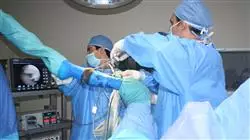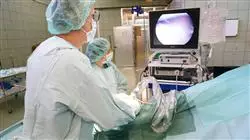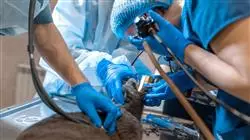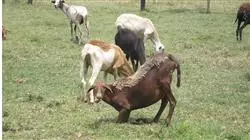University certificate
The world's largest faculty of veterinary medicine”
Why study at TECH?
Large animals can have complex pathologies, so it is necessary to have specialized veterinarians who can treat them”

Get trained with us and learn how to diagnose and treat diseases in Large Animals, in order to improve their quality of life"
Clinical practice is a very dynamic activity, new treatments are constantly appearing in scientific publications and veterinarians must be aware of them in order to be able to offer these options to their clients. Each of the modules in this program covers one of the organ systems, with emphasis on those systems that are most frequently affected in the Large Animals.
Camelids of the New World or South America, which include mainly llamas and alpacas as domesticated animals, are animals bred for different purposes including fiber production, pack animals or meat production in South America, guard animals for other animals such as small ruminants and also as companion animals. This Postgraduate diploma provides advanced knowledge to diagnose, treat and prevent these diseases.
The horse clinician faces the challenges posed by these patients on a daily basis. Gastrointestinal pathologies are the most frequent cause of emergency calls from owners. Many of these horses suffer from mild illnesses that are resolved with appropriate treatments, but a small group suffer very serious injuries that require surgical treatment. It is necessary to interpret the clinical signs of these patients promptly in order to improve their prognosis; this program provides the main tools to successfully deal with these cases.
Sports medicine forms an important block within Equine Internal Medicine, since many of the horses we have today are dedicated to sporting activities. Working with these horses is very rewarding but also requires a high degree of specialization, especially in pathologies that affect the cardiorespiratory system. This program generates specialized knowledge that allows the equine clinician to evaluate the athletic prognosis of those patients with conditions that influence their athletic performance.
This program is designed by professors with the highest recognized degree of specialization, thus guaranteeing its quality in all aspects, both clinical and scientific, in large animals.
This Postgraduate diploma is the best investment you can make when choosing a refresher program to update your knowledge in Emergencies in Large Animals''
This Postgraduate diploma in Emergencies in Large Animals contains the most complete and up-to-date scientific program on the market. The most important features include:
- Practical Cases presented by experts in Emergencies in Large Animals
- The graphic, schematic, and practical contents with which they are created, provide scientific and practical information on the disciplines that are essential for professional development
- Latest innovations on Emergencies in Large Animals
- Practical exercises where self-assessment can be used to improve learning
- Special emphasis on innovative methodologies in Emergencies in Large Animals
- Theoretical lessons, questions to the expert, debate forums on controversial topics, and individual reflection assignments
- Content that is accessible from any fixed or portable device with an Internet connection
This Postgraduate diploma is the best investment you can make when choosing a refresher program to update your knowledge in Emergencies in Large Animals''
It includes, in its Teaching staff, Professionals belonging to the veterinary field, who pour into this training the experience of their work, in addition to recognized Specialists from Reference Societies and Prestigious Universities.
The multimedia content, developed with the latest educational technology, will provide the professional with situated and contextual learning, i.e., a simulated environment that will provide immersive training programmed to train in real situations.
This program is designed around Problem-Based Learning, whereby the specialist must try to solve the different professional practice situations that arise throughout the program. For this, the professional will have the help of an innovative interactive video system made by renowned and experienced experts in Internal Medicine in Large Animals.
This program comes with the best educational material, providing you with a contextual approach that will facilitate your learning"

This 100% online program will allow you to combine your studies with your professional work while increasing your knowledge in this field"
Syllabus
The structure of the content has been designed by the best professionals in the field of Emergencies in in Large Animals, with extensive experience and recognized prestige in the profession, backed by the volume of cases reviewed, studied, and diagnosed, and with extensive knowledge of new technologies applied to veterinary medicine.

We have the most complete and up-to-date academic program in the market. We strive for excellence and for you to achieve it too"
Module 1. Alterations of the Gastrointestinal System in Large Animals
1.1. Clinical Examination and Diagnostic Tests
1.1.1. Physical Examination
1.1.2. Imaging Techniques
1.1.3. Endoscopy
1.1.4. Absorption and Digestion Test
1.1.5. Other Tests
1.2. Alterations that Affect the Stomach of Equidae
1.2.1. Gastric Ulcer Syndrome
1.2.2. Stomach Impactions
1.2.3. Other Diseases that Affect the Stomach
1.3. Strangulation Lesions in Horses
1.3.1. Strangulation Lesions of the Small Intestine
1.3.2. Strangulation Lesions of the Large Intestine
1.4. Obstructive Lesions in Horses
1.4.1. Obstructive Lesions of the Esophagus
1.4.2. Obstructive Lesions of the Small Intestine
1.4.3. Obstructive Lesions of the Large Intestine
1.5. IBD: Inflammatory Diseases/ Malabsorption Syndrome in Equidae
1.5.1. Clinical Approach
1.5.2. Alimentary Lymphosarcoma
1.5.3. Granulomatous Enteritis
1.5.4. Eosinophilic Enterocolitis
1.5.5. Lymphocytic-Plasmocytic Enterocolitis
1.5.6. Proliferative Enteropathy
1.5.6. Others
1.6. Pathologies that Affect the Liver
1.6.1. Liver Disease and Liver Failure
1.6.2. Clinical Signs of Liver Disease
1.6.3. Acutre Liver Diseases
1.6.4. Chronic Liver Diseases
1.6.5. Vascular and Congenital Diseases
1.7. Colitis, Enteritis and Peritonitis
1.7.1. Colitis
1.7.2. Enteritis
1.7.3. Treatment Options for Horses With Acute Diarrhea
1.7.4. Peritonitis
1.8. Gastrointestinal Alterations in Cattle
1.8.1. Examination of the Gastrointestinal System in Cattle
1.8.2. Alterations of the Oral Cavity
1.8.3. Indigestion
1.8.4. Traumatic Reticuloperitonitis
1.8.5. Abomasal Displacements and Other Abomasal Alterations
1.8.6. Obstructive Intestinal Alterations
1.8.7. Diarrhea in Adult Cattle
1.9. Gastrointestinal Alterations of Small Ruminants
1.9.1. Examination of the Gastrointestinal System in Small Ruminants
1.9.2. Alterations of the Oral Cavity
1.9.3. Indigestion and Other Pre-Stomach Disturbances
1.9.5. Enterotoxemias
1.9.4. Diarrhea in Adult Sheep and Goats
1.10. Gastrointestinal Alterations in Camelids
1.10.1. Anatomy and Physiology of the Gastrointestinal Tract of Camelids
1.10.2. Diagnostic Techniques
1.10.3. Congenital Gastrointestinal Pathologies
1.10.4. Diseases of the Oral Cavity
1.10.5. Diseases of the Esophagus
1.10.6. Pathologies of Gastric and Pre-Stomach Compartments
1.10.7. Enteritis and Diarrhea
1.10.8. Acute Abdomen and Colic
1.10.9. Neoplasms of the Gastrointestinal Tract
Module 2. Neonatology in Large Animals
2.1. Clinical Approach to Newborn Foals
2.1.1. Examination of Newborn Foals
2.1.2. System Evaluation
2.1.3. Examination of the Mother and the Placenta
2.2. Septicemia in Foals
2.2.1. Risk Factors
2.2.2. Clinical Signs
2.2.3. Diagnosis
2.2.4. Treatment
2.2.5. Prognosis
2.3. Neonatal Hypoxia Syndrome in Foals
2.3.1. Etiopathogenesis
2.3.2. Clinical Signs
2.3.3. Diagnosis
2.3.4. Treatment
2.3.5. Prognosis
2.4. Respiratory Alterations in Newborn Foals
2.4.1. Choanal Atresia
2.4.2. Wry Nose
2.4.3. Pneumonia
2.4.4. Acute Respiratory Distress Syndrom
2.4.5. Rib Fracture
2.4.6. Management of Foals With Pulmonary Pathologies
2.5. Genitourinary Alterations in Newborn Foals
2.5.1. Patent Urachus
2.5.2. Uroperitoneum
2.5.3. Renal Insufficiency
2.5.4. Inguinal and Scrotal Hernias
2.5.5. Ectopic Urethers
2.6. Digestive Alterations in Newborn Foals
2.6.1. Dysphagia
2.6.2. Gastric Ulcer Syndrome
2.6.3. Approach to Newborns With Colic
2.6.4. Meconium Impaction
2.6.5. Diarrhea / Enterocolitis
2.7. Intensive Care, Treatment and Procedures
2.7.1. Monitoring of the Newborn
2.7.2. Care of the Nursing Foal
2.7.3. Fluid Therapy
2.7.4. Food for a Sick Foal
2.7.5. Antibiotherapy
2.7.6. Cardiopulmonary Resuscitation
2.8. Main Problems in Calves
2.8.1. Congenital Diseases
2.8.2. Trauma and Death During Birth
2.8.3. Prematurity, Dysmaturity and Neonatal Maladjustment
2.8.4. Diseases and Perinatal Problems
2.8.5. Diseases Associated With Reproductive Biotechnologies
2.8.6. Failure of Transfer of Colostral Immunoglobulins
2.8.7. Diarrhea in Calves
2.9. Main Problems in New Born Small Ruminants
2.9.1. Congenital Diseases
2.9.2. Prematurity, Dysmaturity and Neonatal Maladjustment
2.9.3. Perinatal Problems
2.9.4. Gastrointestinal Tract Diseases
2.9.5. Locomotor Apparatus Diseases
2.9.6. Failure of Transfer of Colostral Immunoglobulins
2.10. Main Problems in Newborn Camelids
2.10.1. Congenital Diseases
2.10.2. Prematurity, Dysmaturity and Neonatal Maladjustment
2.10.3. Perinatal Problems
2.10.4. Gastrointestinal Tract Diseases
2.10.5. Locomotor Apparatus Diseases
2.10.6. Failure of Transfer of Colostral Immunoglobulins
Module 3. Ophthalmology in Large Animals
3.1. Anatomy and Diagnostic Tests
3.1.1. Anatomy and Physiology of the Eyeball
3.1.2. Optic Nerve Blocks
3.1.3. Ophthalmologic examination
3.1.4. Basic Diagnostic Tests
3.1.5. Tonometry
3.1.6. Direct and Indirect Ophthalmoscopy
3.1.7. Ocular Ultrasonography
3.1.8. Other Diagnostic Imaging Tests
3.1.9. Electroretinography
3.1.10. Sub-palpebral Catheter Placement
3.2. Alterations of the Eyelids, Conjunctiva and Nasolacrimal Duct in Equidae
3.2.1. Anatomy of Adnexal Tissues
3.2.2. Alterations of the Ocular Orbit
3.2.3. Eyelid Alterations
3.2.4. Alterations of the Ocular Conjunctiva
3.2.5. Alterations of the Nasolacrimal Duct
3.3. Corneal Ulcers in Horses
3.3.1. General Aspects
3.3.2. Classification of Corneal Ulcers
3.3.3. Simple, Complex and Severe Ulcers
3.3.4. Indolent Ulcer
3.3.5. Iridocele and Ocular Perforation
3.3.6. Keratomalacia (Melting)
3.4. Infectious Keratitis and Stromal Abscesses in Equidae
3.4.1. Parasitic Keratitis
3.4.2. Viral Keratitis
3.4.3. Fungal Keratitis
3.4.4. Bacterial Keratitis
3.4.5. Stromal Abscess
3.4.6. Corneal Surgery
3.5. Immune-Mediated Diseases and Idiopathic Nonulcerative Keratitis of the Cornea in Equidae
3.5.1. General Aspects. Classification
3.5.2. Superficial Immune-Mediated Keratitis
3.5.3. Deep-Mid-Stromal Immune-Mediated Keratitis
3.5.4. Endolethial Immune-Mediated Keratitis
3.5.5. Other Immune-Mediated Diseases of the Cornea
3.6. Equine Recurrent Uveitis and Other Uveal Disorders in Equidae
3.6.1. Anatomy and Physiology of the Uveal Tract
3.6.2. Congenital Diseases of the Uvea
3.6.3. Acute Uveitis
3.6.4. Equine Recurrent Uveitis
3.7. Other Ocular Alterations of Equidae
3.7.1. Crystalline Lens Alterations
3.7.2. Alterations of the Retina and Glaucoma
3.7.3. Ocular Neoplasms and the Adjacent Structures
3.8. Ocular Alterations in Cattle
3.8.1. Infectious Keratoconjunctivitis
3.8.2. Ocular Carcinoma
3.8.3. Other Alterations of the Eyelids, Conjunctiva and Adjacent Tissue
3.8.4. Other Ocular Alterations
3.9. Ocular Alterations in Small Ruminants
3.9.1. Diseases of the Ocular Orbit
3.9.2. Infectious Keratoconjunctivitis
3.9.3. Parasitic Keratitis
3.9.4. Retinal Degeneration
3.9.5. Blindness
3.10. Ocular Alterations in Camelids
3.10.1. Congenital Diseases
3.10.2. Ulcerative Keratitis
3.10.3. Parasitic Keratitis
Module 4. Infectious and Parasitic Diseases in Major Species
4.1. Prevention and Control of Infectious Diseases
4.1.1. Laboratory Diagnostic Tests
4.1.2. Antimicrobial Tests and Resistances
4.1.3. Use of Vaccines
4.1.4. Biosecurity and Control Measures
4.2. Main Infectious and Contagious Diseases in Horses
4.2.1. Notifiable Diseases
4.2.2. Diseases Caused by Bacteria
4.2.3. Viral diseases
4.2.4. Diseases Caused by Fungi
4.3. Main Infectious and Contagious Diseases in Cattle
4.3.1. Notifiable Diseases
4.3.2. Diseases Caused by Bacteria
4.3.3. Viral diseases
4.3.4. Diseases Caused by Fungi
4.3.5. Diseases Caused by Prions
4.4. Main Infectious and Contagious Diseases in Small Ruminants
4.4.1. Notifiable Diseases
4.4.2. Diseases Caused by Bacteria
4.4.3. Viral diseases
4.4.4. Diseases Caused by Fungi
4.4.5. Diseases Caused by Priones
4.5. Main Infectious and Contagious Diseases in Camelids
4.5.1. Notifiable Diseases
4.5.2. Diseases Caused by Bacteria
4.5.3. Viral diseases
4.5.4. Diseases Caused by Fungi
4.6. Main Parasites Affecting Horses
4.6.1. Hemoparasites
4.6.2. Small Strongyls or Cyathostomes
4.6.3. Big Strongyls
4.6.4. Ascarids
4.6.5. Other Nematodes
4.6.6. Cestodes
4.7. Main Parasites Affecting Cattle
4.7.1. Hemoparasites
4.7.2. Gastrointestinal Nematodes
4.7.3. Nematodes That Affect the Respiratory Tract
4.7.4. Cestodes
4.7.5. Trematodes
4.7.6. Coccidia
4.8. Main Parasites Affecting Small Ruminants
4.8.1. Hemoparasites
4.8.2. Gastrointestinal Nematodes
4.8.3. Nematodes That Affect the Respiratory Tract
4.8.4. Cestodes
4.8.5. Trematodes
4.8.6. Resistance to Anthelmintics in Small Ruminants
4.8.7. Management, Treatment and Control Programs (FAMACHA)
4.9. Main Parasites Affecting Camelids
4.9.1. Hemoparasites
4.9.2. Coccidia
4.9.3. Nematodes
4.9.4. Cestodes
4.10. Prevention and Treatment of Parasitic Diseases
4.10.1. Diagnostic Techniques
4.10.2. Therapeutic Principles
4.10.2. Resistance Development
4.10.3. Management and Control Programs

This training will allow you to advance in your career comfortably"
Postgraduate Diploma in Emergencies in Large Animals
.
If you are passionate about veterinary medicine and have a special interest in caring for larger species such as horses, cows and other large animals, our Postgraduate Diploma in Emergencies in Large Animals program is perfect for you. At TECH Global University, we understand the importance of having professionals trained in the care of these animals that are essential in various sectors.
Enroll now and start in online mode
.
Our program is taught in online mode, which allows you to study from anywhere and adapt it to your schedule. At TECH Global University, we are committed to providing you with a quality and practical education that will prepare you to face the challenges and emergencies that may arise in the care of older species. In this program, you will acquire up-to-date knowledge about the main emergencies and diseases that affect these species. You will learn how to identify and treat medical and traumatic conditions, as well as how to perform clinical evaluations, administer medications and apply safe handling and restraint techniques. Our team of expert faculty will guide you through interactive modules, case studies and simulations that will allow you to develop practical skills and make sound decisions in emergency situations. In addition, you will have access to state-of-the-art resources and tools used in the field of veterinary medicine. Upon completion of the Postgraduate Diploma in Emergencies in Large Animals program, you will be prepared to work in specialized veterinary clinics, equine hospitals, livestock operations and other institutions dedicated to the care of large animals. You will be able to work as an emergency veterinarian, equine medicine specialist or animal health consultant. At TECH Global University, we are committed to providing you with a quality education that will prepare you to excel in the field of veterinary medicine. Join our educational community and become an expert in the care of larger species. Enroll in our Postgraduate Diploma program and contribute to the well-being of these magnificent animals!







